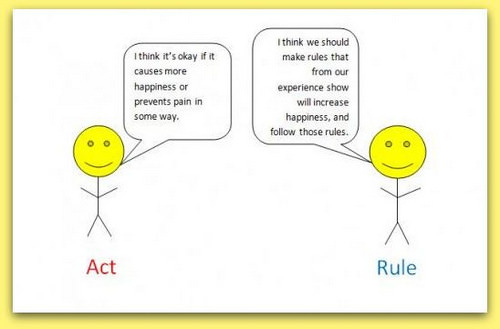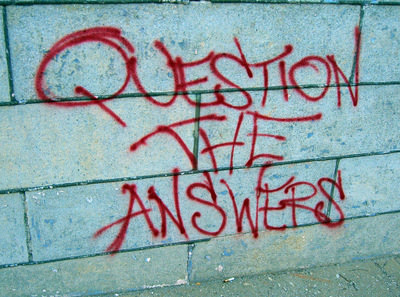功利主义
章节大纲
-
Utilitarianism: The Basic Idea
::实用主义:基本思想To overcome the obvious defects of using Egoism as a moral guide, Utilitarianism approaches the question of the good from an opposing point of view. Instead of that being the good which serves one's own interest and provides for one's own pleasure, the Utilitarian’s take that which produces the greatest amount of pleasure (Hedonism--Physical and emotional) for the greatest number of people to be the good . This is the principle of utility . Expand beyond the idea of pleasure to that of satisfying the interests of people and you have the more complete development of the idea of what consequences of human action will determine the moral correctness of that act.
::为了克服将Egoism作为道德指南的明显缺陷,利用公利主义从相反的观点来对待善的问题。它不是为自身利益服务、提供自己快乐的善,而是将产生最大程度的快感(Hedonism-Physical和情感)的善(Hedonism-Physic和情感)的善(Hedonism-Physical和情感)归为善)。这是实用原则。除了满足人民利益的快感概念之外,将快乐概念扩大到满足人民利益的概念,而你更全面地认识到人类行动的后果将决定这种行为的道德正确性。Utility is a principle of the good which locates moral goodness in the feelings of humans and that makes it the form of Hedonism . However, Utility's aim is increasing the total amount of satisfaction or happiness for the greatest number of people and not just oneself. The morally good thing to do is whatever promotes the greatest utility even if the individual acting will not prosper or be satisfied. It would be nice if the actor benefits as well but it is the interests of the many and the most over the one that is what Utility is about.
::功用是善的一个原则,它把道德上的善良放在人的感情中,使它成为一种Hedonism的形式。然而,功用的目的是增加大多数人的满意或幸福的总数,而不仅仅是自己。无论什么促进最大的好处,不管个人的行为不会繁荣或满足。如果行为者也受益,那将是一件好事,但是,这是许多人的利益,并且是多数人的利益,而不是多数人的利益。The Principle of Utility
::效用原则The theory developed from an attempt to direct the lawmakers of England to consider the common good rather than the welfare of their social class when they made laws. The good is that which provides for the happiness of the greatest number of people even if it results in no happiness to the agent at all. In this approach each human being has exactly the same worth as all other human beings. In this view the benefit of the action must be maximized:
::理论是从试图指导英格兰立法者在制订法律时考虑社会阶层的共同利益而不是福利而发展而来的。善在于为大多数人提供幸福,即使它不会给代理人带来幸福。在这种方式中,每个人与所有其他人都有完全相同的价值。在这种观点中,必须最大限度地扩大行动的好处:When confronted by some situation and facing a choice or dilemma and when considering what would be the correct thing to do, what would be right, what would be good, the U tilitarian would:
::当面对某种局势,面对一种选择或两难境地,在考虑什么是正确的事情时,什么是正确,什么是好,那么,利用者将:-
C
onsider the options available, however many there are.
::考虑现有的选择,不管有多少选择。 -
C
alculate how much happiness would be produced were each of the options to be acted upon or how many interests of how many people would be satisfied
::计算要对每种选择采取行动,或满足多少人的利益,将产生多少幸福,将产生多少幸福 -
D
etermine which option produces the greatest resulting happiness or the greatest number of interests being satisfied for greatest number of people
::确定哪种选择能产生最大结果的幸福或最大利益得到满足的人最多 -
C
hoose that option which produces the greatest amount of happiness for the greatest number of people, or the greatest number of interests being satisfied for greatest number of people, therefore, the greatest utility.
::选择能为最多的人带来最大数量幸福的选择,或者为最多的人带来最大数量的利益得到满足的选择,因此,这是最大的效用。
Note: it is not a matter of making the majority (>50%) happy but the greatest possible number of people. So if there are three options, (a),(b), and (c) and (a) makes 87% happy, (b) makes 76% happy and (c) makes 89% happy the Utilitarian must choose to do (c). Choice (c) is the good or the morally correct choice while the others (a) and (b) are not good or would be morally incorrect choices.
::注意:这不是让大多数人( > 50%)快乐的问题,而是让尽可能多的人幸福的问题。因此,如果有三种选择,(a)、(b)、(c)和(a)使87%的人幸福,(b)使76%的人幸福,(c)使89%的人幸福,公用事业者必须选择做(c)选择。选择(c)是好的或道德上正确的选择,而其他人(a)和(b)不是好的或道德上不正确的选择。Read
::已读EPISD Informed Problem Solvers Goal
::EPISD 信息化解决问题者目标Act and Rule Utilitarianism
::行为和规则 功利主义There is a difference between Rule Utilitarianism and Act Utilitarianism . The A ct U tilitarian considers only the results or consequences of the single act while the R ule U tilitarian considers the consequences that result of following a rule of conduct.
::规则公利主义和行为公利主义之间有区别。 法律公利主义只考虑单一行为的结果或后果,而规则公利主义则考虑遵守行为规则的后果。Crash Course Utilitarianism
::崩溃课程功利主义Why are there two different approaches (Act and Rule) to Utilitarianism? Consider the following case:
::6. 为什么对利用公利主义有两种不同的做法(行为和规则)?Someone goes to the doctor. The person is ill, experiences pain and dysfunction. The doctor performs a series of test and examinations. The person returns to the doctor's office to learn of the results, the diagnosis and prognosis. The doctor is aware that the tests all show that the person has a disease that is incurable and life threatening. In fact even under the most aggressive treatment option there is a survival rate of less than 15% for two years. The doctor is considering what would be good to tell the person. Should the person know the truth or should the person be told something other than the truth? Which is better? Which is the right thing to do? What would be the good to do?
::病人去看医生。 病人生病,经历疼痛和机能障碍。 医生进行一系列的检查和检查。 病人返回医生办公室了解结果、诊断和预诊。 医生知道所有的检查都表明病人患有无法治愈的疾病,生命受到威胁。 事实上,即使最积极的治疗选择,两年的存活率也低于15%。 医生正在考虑告诉病人什么是好的。 病人应该知道真相,还是应该告诉别人一些事实以外的事情? 哪更好? 做哪一件是对的? 做什么好? 做什么好呢?The A ct Utilitarian might calculate that in telling the truth there will be a great deal of pain and no pleasure at all. The person will be upset, their family will be upset, the doctor will be upset. Informing the ill person that there is nothing that the doctor can do to alter their condition will upset everyone. The doctor's staff will be upset seeing the person come in for whatever treatment there may be. On the other hand if the doctor makes up a story concerning the diagnosis and prognosis that is not true but that gives the ill person more time to enjoy life before the illness makes it obvious that the end is near, well then the results are different. The doctor is not so upset in seeing the person, the doctor's staff is not upset. The family and friends of the person have some more time with that person to enjoy things instead of being morose and depressed. So the A ct Utilitarian might calculate that the good in this case is to lie.
::法律助理可能会计算出,在说出事实时,会有很大的痛苦和快乐。 病人会感到沮丧, 家人会感到不快, 医生会感到不快。 告诉病人医生无法改变他们的状况, 医生会让每个人都感到不快。 医生的员工会很不高兴看到病人来接受任何治疗。 另一方面,如果医生编造了一个有关诊断和预产的故事,但事实并非如此,但是这给病人更多时间享受生活的时间, 病人就会在病情显示末日即将到来之前, 那么结果就会不同了。 医生在看病人时不会感到很不安, 医生的员工不会心烦。 病人的家属和朋友有更多的时间和病人一起享受一些东西,而不是沉闷和沮丧。 因此,法律助理可能计算出本案的优点是说谎。The R ule Utilitarian would need to consider what would the long term consequences be if doctors were to lie to those who come to them and have life threatening, incurable illnesses. The R ule U tilitarian might calculate that people would no longer be able to trust their doctors and this would break down the confidence they need for their therapies to be effective. The Rule Utilitarian might calculate that there is far more harm in lying and so the good is to tell the truth.
::规则使用者需要考虑,如果医生对来到他们身边并有生命威胁的人撒谎并患上不治之症,长期的后果会是什么。 规则使用者可能计算人们将不再能够信任他们的医生,这将打破他们所需要的信心,使他们的疗法能够有效。 规则使用者可能计算谎言的伤害要大得多,因此好处是说出真相。The same result might obtain were there to be a consideration of cheating on an examination. The single act might produce a great deal of happiness for the cheater, teacher, family and friends. The rule of cheating might produce quite the opposite result as society could no longer trust that the doctors, lawyers, engineers, repair people etc... really know what they are doing and deserve their position.
::如果考虑在考试上作弊,结果可能是一样的。 单项行为可能会给作弊者、教师、家人和朋友带来巨大的幸福。 作弊规则可能会产生相反的结果,因为社会不再相信医生、律师、工程师、修理人员等...真的知道他们在做什么,值得他们的地位。Rule U tilitarianism (RU) has no rule other than utility. Every act is evaluated according to the utility. Does it or doesn't it produce happiness. Utilitarian’s must maximize happiness. They must never accept unhappiness if they can minimize it.
::规则实用主义(RU)除了实用主义(RU)之外别无其他规则。 每种行为都是根据实用主义来评估的。 是否它能带来幸福。 使用者必须最大限度地实现幸福。 如果他们能最大限度地减少不幸福,他们绝不能接受不幸福。Both A ct and R ule U tilitarian’s must assume nothing. They must actually poll or measure what act will produce the greatest utility.
::行为和规则都不得有任何假定。 他们必须实际调查或衡量什么行为能产生最大的效用。The difference is that the:
::区别在于:-
Act
U
tilitarian measures the consequences of a single act.
::“实用行为”衡量单项行为的后果。 -
R
ule
U
tilitarian measures the consequences of the act repeated over and over again through time as if it were to be followed as a rule whenever similar circumstances arise.
::规则效用衡量该行为的后果,如同在出现类似情况时作为惯例一样,一而再、再而三地重复地衡量该行为的后果。
N othing is right or wrong in itself for a utilitarian. N othing ! It all depends on the consequences of the act -- the results are what matters not the act.
::对于功利主义来说,任何事物本身都不是对的或错的,没有什么!这都取决于行为的后果 -- -- 结果与行为无关。The idea behind Rule Utilitarianism is that whenever you are in a situation and have alternatives you calculate the utility to be produced by adopting a course of action (rule) which would produce the greatest utility in the long run if it were followed every time that situation arose.
::规则实用主义背后的理念是,每当你处于某种状况并有其他选择时,你就会计算通过采取行动方针(规则)产生的效用,如果每次出现这种情况时都遵循这一方针,从长远来看,这将产生最大的效用。Let's consider the rule that states you must stop your vehicle at a red traffic light.
::让我们考虑一下规则 规定你必须在红灯下停车EPISD Critical Knowledge and Creative Thinking Goal
::EPISD 关键知识和创造性思维目标Situation : Pregnant woman in back seat. About to deliver. Water has broken. Contractions are 2 minutes apart. It is 4 am. The vehicle is 2 miles from the hospital. There are no other cars around. The RU would think if you were as a rule to break the law and go through that red light it would produce more utility than not doing so and therefore it would be the morally good thing to do. So the RU rule would be to go through red lights whenever it is 4 AM and there is a pregnant woman in the back seat who is about to deliver and you are heading to the hospital.
::孕妇情况: 孕妇坐在后座,即将分娩。 水已经断裂。 合同隔了2分钟, 是4点。 车辆离医院只有2英里。 周围没有别的汽车。 路运联盟会认为,如果你是违法的, 穿过红灯, 这样做比不这样做更有用处, 因此这样做在道义上是件好事。 因此, 路运联盟的规则是,在清晨4点, 后座有一位孕妇即将分娩, 你将前往医院。Problems with the Theory :
::与理论有关的问题:-
It is difficult if not impossible to do the calculations required. How do you measure the happiness (pleasure) produced?
::如果不是不可能,也很难进行所要求的计算。你怎样计算所创造的幸福呢? -
Not everyone will be able to measure their happiness.
::并不是每个人都能衡量自己的幸福。 -
One persons’ maximum happiness may not be the equal of another person’s maximum.
::一个人的最大幸福可能不等于另一个人的最大幸福。 -
Do the calculations range over 1 year, ten years, century, etc..? How long?
::计算范围是否超过1年、10年、世纪等等? -
Do the calculations measure the happiness for a small group, entire country, the whole world?
::计算是否测量了一小群人,整个国家,整个世界的幸福? -
Do they consider only humans or non-humans who are
sentient
beings (have awareness and feelings). Peter Singer is a Utilitarian who includes all sentient beings.
::难道他们只认为人类或非人类是神明的吗?彼得·辛格(Peter Singer)是一名富足的仆人,他包括一切有神明的人。 -
The theory can support opposing actions on different occasions as the correct or the good thing to do.
::理论可以支持不同场合的对立行动,作为正确或好的做法。 -
The theory can’t really resolve conflicts in views, e.g...Sometimes it supports lying, cheating, killing, stealing, etc... and sometimes not.
::理论无法真正解决观点上的冲突, 例如...有时它支持说谎、欺骗、杀戮、偷窃等等, -
The theory can support doing horrible, heinous acts, as long as they produce the greatest amount of pleasure for the greatest number of people. There is no act that is wrong in and of itself. Murder, lies, rape, child molestation, whatever can be the
good
thing to do.
::理论可以支持进行可怕的、令人发指的行为,只要它们能给尽可能多的人带来最大的快乐。 没有任何行为本身就是错误的。 谋杀、谎言、强奸、儿童骚扰,不管什么是好事。 -
The theory treats all people as being equal. It does not take into consideration special relationships that exist between people, for example the relationships of family members.
::理论认为所有人都是平等的,没有考虑到人与人之间的特殊关系,例如家庭成员的关系。
In the next section we examine approaches to determining right from wrong that does not consider the consequences of the acts but the acts themselves and the intentions of the actors.
::在下一节中,我们研究确定对错的权利的方法,其中不考虑行为的后果,而考虑行为本身和行为者的意图。Read
::已读EPISD Informed Problem Solvers Goal
::EPISD 信息化解决问题者目标Philosophy Application
::哲学应用EPISD Critical Knowledge and Creative Thinking Goal
::EPISD 关键知识和创造性思维目标Vocabulary
::词汇表EPISD Effective Bilingual Education Goal
::EPISD 有效双语教育目标-
N
othing
is right or wrong in itself for a utilitarian. N
othing
! It all depends on the consequences of the act, the results are what matters not the act.
::对于一个功利主义者来说,任何事物本身都不是对的或错的,任何功利主义者都不对!这都取决于行为的后果,结果不是行为。
-
C
onsider the options available, however many there are.





